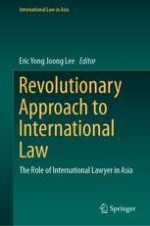2023 | OriginalPaper | Buchkapitel
9. Inflation Reduction Act’s Clean Vehicle Provisions: Analysis of Potential International Trade Law Violations
verfasst von : Soojin Nam
Erschienen in: Revolutionary Approach to International Law
Verlag: Springer Nature Singapore
Aktivieren Sie unsere intelligente Suche, um passende Fachinhalte oder Patente zu finden.
Wählen Sie Textabschnitte aus um mit Künstlicher Intelligenz passenden Patente zu finden. powered by
Markieren Sie Textabschnitte, um KI-gestützt weitere passende Inhalte zu finden. powered by
